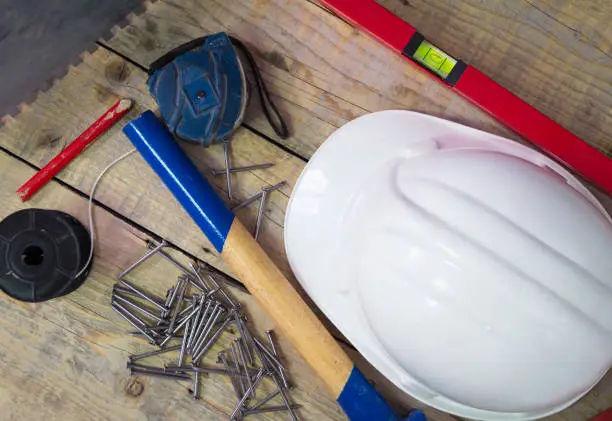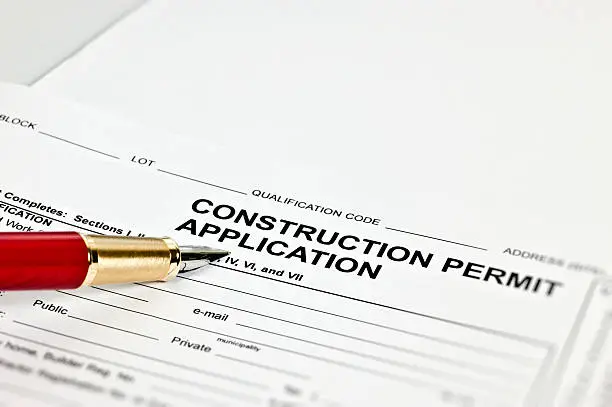When embarking on a home improvement project, hiring the right contractor is crucial to ensuring a successful outcome. With so many contractors to choose from, how can you be certain you’re making the best decision? By following expert “tips for hiring a contractor” and being aware of potential pitfalls, you can avoid costly mistakes and ensure a smooth, hassle-free renovation experience. In this blog post, we’ll guide you through the entire process, with tips from understanding contractor roles to securing a comprehensive contract and more.
Short Summary
- Understand contractor roles and verify licensing & insurance before hiring.
- Research contractors, review work samples & references, obtain price quotes and establish upfront guidelines prior to project start.
- Be aware of potential red flags when hiring a contractor. R&H Distressed Properties offers an easy sale without need for repairs or appraisals.
Understanding Contractor Roles

Before diving into the process of hiring a contractor, it’s important to understand the difference between a general contractor and tradespeople. A general contractor oversees the entire project and is responsible for coordinating and managing all aspects of the job, while tradespeople specialize in a particular trade and are typically the most skilled and experienced in their field. Working with licensed general contractors is strongly recommended, especially for essential home functions such as electrical and plumbing, to ensure safety and quality. Failing to hire a reputable contractor can result in project failure and even financial loss.
When hiring a contractor, it’s crucial to work with someone who has a valid contractor’s license, and a contractor’s license number. Licensed contractors must take yearly continuing education classes, pass an exam, and have liability and property damage insurance. This not only guarantees that they are knowledgeable and up-to-date with industry standards, but it also provides homeowners with access to the Contractor Recovery Fund, which can compensate for any financial loss due to defective work or fraudulent practices.
Finding the Right Contractor for Your Project

To find the right contractor for your project, you’ll need to do some research. Start by verifying the potential contractor*’s license and insurance, reviewing work samples and references, and interviewing potential contractors. When researching potential contractors, make sure they are insured and qualified, and if you’re working with a company, confirm that their employees and subcontractors have undergone background checks, received training, and are certified. It’s also essential to obtain multiple price quotes from various contractors to ensure you’re getting a fair rate. Keep in mind that the lowest bid may not always be the best choice, as it could compromise the quality of the work. Also finding a contractor that’s in the remodeling industry will be helpful. A local insurance company may also provide some helpful recommendations.
When discussing your project with potential contractors, be as detailed as possible about your expectations and requirements. This will enable them to provide more accurate estimates and help you make an informed decision. It’s also a good idea to start with a smaller project before committing to a larger one, so you can assess the potential contractor’s work and determine if they’re a good fit for your needs.
Remember, it’s essential to establish guidelines and expectations upfront to prevent any surprises down the line.
Verify Contractor’s License and Insurance
Before hiring home improvement contractors, it’s crucial to verify their licensing and insurance status. In Minnesota, for example, it’s important to understand the distinction between a registered contractor and a licensed contractor, as registered contractors are not required to provide proof of insurance or proof of bonding and do not contribute to the Contractor Recovery Fund.
To verify a contractor’s license and history, you can request their license number and contact the appropriate state department or verify the licensed status online. Hiring an unlicensed contractor can leave you ineligible for the Contractor Recovery Fund, which compensates homeowners who have experienced financial loss due to a licensed contractor’s defective work or fraudulent practices.
Review Work Samples and References
Examining a contractor’s work samples and references is essential to assess their expertise and the quality of their past projects. When verifying a contractor’s past work, consider the quality of their products, workmanship, and customer service, and inquire about their professional reputation and years in business with the Better Business Bureau.
Additionally, visiting a contractor’s current job site can give you a comprehensive understanding of what to expect for your own project.
Preparing for Contractor Meetings

When preparing for contractor meetings, it’s important to be clear about what you want to achieve with your project and to have a well-defined budget in mind. This will help contractors provide more accurate estimates and optimize the initial consultation. Gather all necessary documents, blueprints, and building plans before the meeting, and compile a list of questions and concerns to address during the consultation.
The initial appointment with a contractor is an opportunity for both parties to interview each other and determine if they’re a good fit. A reliable contractor will also assess the homeowner to ensure they’re a suitable client. By being well-prepared and organized, you’ll demonstrate responsibility and good communication skills, which can help build trust and set the stage for a successful working relationship.
Securing a Comprehensive Contract

Once you’ve chosen a contractor, it’s essential to secure a comprehensive contract that includes a detailed description and summary of the work to be completed, payment schedule, written change order provision, and mechanic’s lien protection. A detailed contract ensures that costs, brands of items being installed, approximate start and finish dates, and the complete set of drawings with written specifications are all accounted for, thus setting clear expectations for both parties.
A specific brand for a part may still need to be agreed upon. The contract can include cost allowances, such as “up to $500 for a front door”. This ensures that both parties are on the same page regarding costs and materials, and prevents any misunderstandings or disputes down the line.
Payment Schedule and Mechanic’s Lien
A payment schedule for contracts is essential to ensure that both parties are clear about when payments are due and to protect the homeowner from any potential financial issues. It’s also crucial to have mechanic’s lien protection in place, as a mechanic’s lien can be placed on a homeowner’s property if payment is not rendered to a contractor or supplier for their work or materials.
To avoid potential complications, it’s recommended to use a card or check for payments instead of cash.
Establishing Guidelines and Expectations

Establishing guidelines and expectations for your contractor is crucial to ensure they understand the scope of the project, the timeline for a completion date, and the expectations for quality of work. This includes setting specific working hours, bathroom use, and project deadlines. Clear guidelines and expectations also facilitate accountability for the contractor’s work and ensure satisfaction with the results.
It’s important to communicate these guidelines and expectations with your contractor before work begins, to prevent any misunderstandings or disputes down the line. By having open and honest communication, you’ll set the foundation for a successful working relationship and a smooth, hassle-free project.
Your Responsibilities as a Homeowner

As a homeowner, you have certain responsibilities when working with contractors. These include providing access to the property, obtaining applicable building permits, and paying for materials. It’s also your responsibility to verify a contractor’s license and insurance, review their past work, and obtain multiple estimates to ensure you’re getting a fair price.
Being aware of your responsibilities as a homeowner and following through on them will not only help ensure a successful project, but also build trust and rapport with your contractor. This, in turn, can lead to a smoother, more enjoyable home improvement experience.
Red Flags to Watch Out For

When hiring a contractor, it’s important to be aware of potential red flags that may signal trouble. Some warning signs to watch out for include failure to provide references, requesting payment in advance, lack of a written bid, being unclear about project details, asking to be paid in cash, and presenting a quote that appears too good to be true. Additionally, contractors who have multiple name changes or are unable to answer questions related to the project should be avoided.
By being vigilant and recognizing these red flags, you can protect yourself from potential scams, unscrupulous contractors, and subpar work. Remember, it’s always better to trust your instincts and err on the side of caution when hiring a contractor for your home improvement project.
Selling to Cash House Buyer like R&H Distressed Properties

If you’re looking to sell your home quickly without the hassle of making repairs or dealing with a traditional real estate agent, consider selling to a cash house buyer like R&H Distressed Properties. R&H Distressed Properties is a premier California house buyer that offers a convenient alternative to traditional home sales, with no repairs, inspections, or appraisals required.
Selling to a cash house buyer like R&H Distressed Properties can be a beneficial option for homeowners who require a prompt sale and do not wish to go through the effort of hiring a contractor or making repairs to the property. They are able to close quickly, often within a few days, providing a hassle-free way to sell your home.
A Premier California House Buyer

As a leading California house buyer, R&H Distressed Properties provides numerous advantages for homeowners looking to sell their property fast and without complications. By offering a streamlined selling process, no appraisal requirements, and the ability to sell “as is,” R&H Distressed Properties presents a convenient and stress-free alternative to traditional home sales.
Homeowners can enjoy a speedy closing, reduced risk, and zero contingencies, ultimately simplifying the selling process.
Sell Your House Fast For Cash – R&H Distressed Properties
One of the main benefits of selling to a cash house buyer like R&H Distressed Properties is the ability to sell your property without the need for repairs, inspections, or appraisals. This not only saves you time and effort, but also eliminates the need to hire a contractor or invest in costly repairs before selling your home.
With R&H Distressed Properties, you can enjoy a quick and straightforward selling process, allowing you to move on to your next adventure with ease.
Summary
In conclusion, hiring the right contractor for your home improvement project is crucial to ensure a successful outcome. By following our expert tips, from understanding contractor roles and verifying licensing and insurance, to securing a comprehensive contract and establishing clear guidelines and expectations, you’ll be well-equipped to navigate the contractor hiring process with confidence. Whether you’re embarking on a major renovation or simply looking to sell your home through a cash house buyer like R&H Distressed Properties, having the right information and resources at your disposal can make all the difference in achieving a smooth, hassle-free experience.
Frequently Asked Questions
What to know when choosing a contractor?
When choosing a contractor, it is important to consider factors such as professionalism, experience, reviews, specializations, and qualifications in order to ensure the best quality of work.
Ask for references and do your research to make sure you are selecting the right person for the job.
How not to get ripped off by contractor?
To avoid getting ripped off by a contractor, be sure to do your research and obtain multiple bids from several contractors. Be careful not to pay for the entire job upfront, only use reputable persons or companies, verify their license and insurance information, and don’t be pressured into making a rushed decision.
What to negotiate as a contractor?
As a contractor, it is important to ensure that your next contract rate reflects the value of the work you will provide. Negotiating this rate should involve researching what market rates for reputable contractors are, considering your unique skills and abilities, and making sure to advocate for yourself during negotiations.
Ultimately, successful negotiation comes down to understanding the scope of the job and having the confidence to negotiate a fair rate.
How do you tell a contractor their price is too high?
Thank the contractor for their proposal, then kindly explain that their estimate is beyond your budget. Mention that you understand the effort and time they put into the project and that their bid will still be considered if they can provide a more affordable price.
Request an alternate option for pricing that better meets your budget needs.

